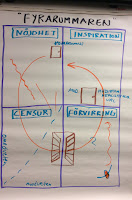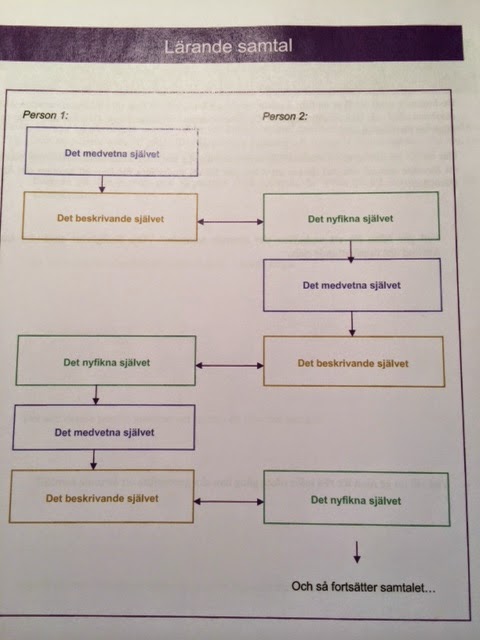The Little Book of Lykke (Happiness)
Meik Wiking har skrivit boken "The Little Book of Lykke - the Danish search for the World´s Happiest people". Meik är CEO på "the Happines Research Institute" i Köpenhamn. Han har ägnat de senaste åren åt att forska kring lycka. Han konstaterar att i flera undersökningar rankas danskar som världens lyckligaste folk.
Enligt Meik så kan man dela in lycka i tre dimensioner. Den "hedonistiska lyckan" (affective dimension) fokuserar på hur lycklig du känner dig i nuet, i vardagen dag för dag. Den "övergripande lyckan" (cognitive dimension) fokuserar på hur lycklig du känner dig generellt utifrån den livssituation du har. Det finns även en tredje dimension (eudaimonia) som härstammar från Aristoteles uppfattning av lycka - ett fokus på att du lever ett meningsfullt liv och har hittat ditt syfte. Meik har i denna bok fokuserat mest på den kognitiva övergripande lyckan - "overall happiness".
Meik identifierar att det finns sex faktorer som ligger till grund för ett lyckligt liv. Se min sammanfattning från boken nedan:
Enligt Meik så kan man dela in lycka i tre dimensioner. Den "hedonistiska lyckan" (affective dimension) fokuserar på hur lycklig du känner dig i nuet, i vardagen dag för dag. Den "övergripande lyckan" (cognitive dimension) fokuserar på hur lycklig du känner dig generellt utifrån den livssituation du har. Det finns även en tredje dimension (eudaimonia) som härstammar från Aristoteles uppfattning av lycka - ett fokus på att du lever ett meningsfullt liv och har hittat ditt syfte. Meik har i denna bok fokuserat mest på den kognitiva övergripande lyckan - "overall happiness".
Meik identifierar att det finns sex faktorer som ligger till grund för ett lyckligt liv. Se min sammanfattning från boken nedan:
- Togetherness -
Believing that you can rely on your friends in times of need.
The capacity of fire and food to bring people together.
9 out of 10 people living in Denmark
say they happily pay their taxes.
Make the effort to speak to your neighbours.
Encourage your friends and family to have
tech-free periods during the week.
- Money -
Generally speaking, in richer countries, people are happier.
But, the relationship between money and happiness is complicated
In US: Inequality results in a decrease of happiness for the people.
Pay now, consume later.
Buy experiences and memories, not things.
Your happiness level when you are young
predicts your income later in life.
Positive people seem more likely to get a degree,
find a job and be promoted.
- Health -
Good health enables us to play,
to seek out adventures and pursue happiness.
In the Nordic countries, free health care is available to everyone
In Copenhagen, 45% of all commutes for work are by bike.
Cycling keeps us more active and healthier,
which in turn keeps us happier
MOVE MORE EACH DAY
practice "forest bathing"
Mindfulness - being present in this moment
Reduce stigma and increase awareness of mental illness
- Freedom -
No people can be truly happy if they do not feel that
they are choosing the course of their own life.
Work-life balance:
At work, the men will say they can´t make a meeting
at 4 p.m because they have to pick up their kids.
That would never happen in London.
There are three things that take away our freedom at work:
meetings, managers and mails.
People who work from home
(or live very close to their workplace) are happier
- Trust -
A successful society is one in which people
have a high level of trust in each other
If we have strong empathetic skills, we are more inclined to
cooperate than to compete and, when we all cooperate,
we are more inclined to trust each other.
Elephant mums:
parents who nurture and encourage their children will give
parents who nurture and encourage their children will give
them the strength to find their own way towards happiness.
In countries with more economic equality, the percentage
of people agreeing that "most people can be trusted" is higher.
- Kindness -
Find ways to bring happiness to others through acts of kindness
A society cannot be happy unless there is
a high degree of altruism among its members.
Cooperation is good for the survival of our species, so
we are wired to feel good when we engage in it.
Find ways you can volunteer to help others.
Improve your community and develop your sense of purpose.
Start doing little Random Acts of Kindness
Avslutningsvis, givetvis ett klipp med Meik från Youtube:



Kommentarer
Skicka en kommentar